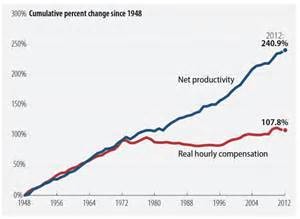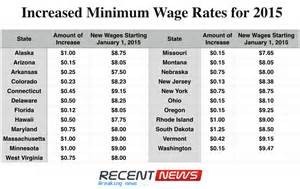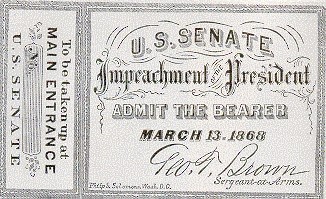Higher Wages Key To Robust Economic Growth
But Republican State Legislatures Heed the Call of ALEC
There remains a frustrating disconnect between the stream of cheerful economic data (lower unemployment rate, growth, the stock market) that would indicate we are steadily recovering from the Great Recession…and the reality that grips millions of working Americans as they struggle to live paycheck-to-paycheck.
Just last week, the US Census Bureau announced that, despite decent employment growth, the year “yielded no improvements in wages and…no improvement in the median incomes of working-age households or drop in the number of people living in poverty.”
The effect of wage stagnation on the overall US economy is palpable. Around 70 percent of our Gross Domestic Product (GDP) is consumer spending. When consumers/workers spend more, businesses prosper and hire more folks to meet the increase in demand. This “demand-side” cycle of prosperity is in direct contradiction to the conservative “supply-side” argument: Cut wages and behold increased profits “trickle down” to working families. We’re still waiting.
It’s quite simple: America needs a raise. And working Americans deserve a raise, seeing how their gains in productivity are not being returned to them. Most of it is flowing to the top.
 This graphic shows the growing gap between productivity (defined as how much economic output is produced on average for every hour of work) versus hourly compensation, which applies to nonsupervisory workers who constitute roughly 80 percent of the workforce. In my opinion, this is the key metric for measuring inequality. According to the Economic Policy Institute,
This graphic shows the growing gap between productivity (defined as how much economic output is produced on average for every hour of work) versus hourly compensation, which applies to nonsupervisory workers who constitute roughly 80 percent of the workforce. In my opinion, this is the key metric for measuring inequality. According to the Economic Policy Institute,
Slow and unequal wage growth in recent decades stems from a growing wedge between overall productivity and pay. In the nearly three decades following World War II, hourly compensation…rose in line with productivity. But for most of the past generation (except for a brief period in the late 1990s), pay for the vast majority has lagged further and further behind productivity.
The Fight for Increasing the Minimum Wage
Attempts by the White House to increase the national minimum wage to $10.10 per hour were ignored by both Republican majorities in Congress. Frustrated, President Obama used his executive powers to increase the minimum wages that government contractors must pay to their workers. The president suggested that states and localities pick up the slack.
The torch was passed in fine fashion. This year, for the first time ever, a majority of states–that’s 29 plus the District of Columbia–passed laws mandating their minimum wage be greater than the federal minimum, which is $7.25 an hour. As a result, at least 3.1 million workers will get a raise.
There’s no better example of the momentum of the minimum wage bandwagon than of certain results of the election of 2014. You might remember the election of 2014: low turnout, negative campaigning, a Republican rout. And yet, in five states, four of them red (Alaska, Arkansas, Nebraska and South Dakota) plus Illinois, ballot measures increasing the state minimum wage were approved by voters by substantial margins.
Amidst this heartening news, a countervailing force has emerged in recent years that has looked askance at cities like Seattle, San Francisco and Chicago that passed hefty minimum wage increases aimed at keeping pace with the cost of urban life.
Yes, ALEC is at it again. You can almost count on it to show up when there is any movement toward social progress. The American Legislative Exchange Council, ALEC, writes “model legislation” on a whole host of issues favored by conservatives. ALEC has enjoyed welcoming open arms ever since the majority of state legislatures flipped to Republican starting in 2010.
Only ‘Dying Wages’ Allowed?
ALEC’s model legislation nullifying cities’ efforts to increase their minimum wage is titled, “Living Wage Mandate Preemption Act.” I’m holding a copy in my hands. It gives states the power to repeal “any and all living wage mandates enacted by any political subdivision…greater than the state’s applicable state minimum wage.”
For example, as recently as September 16, the ALEC legislation became law in Missouri when the Republican supermajorities in both the House (114-46) and Senate (23-9) voted to override Democratic Governor Jay Nixon’s veto.
Meanwhile in Oklahoma, to thwart efforts of an Oklahoma City group circulating a petition to raised the city’s minimum wage to $10.10 an hour, the ALEC bill nullifying the petition was signed into law by Rebublican Governor Mary Fallin in April, 2014. The year before, at its annual meeting in Chicago, Fallin was the recipient of ALEC’s “Thomas Jefferson Award.”
Despite all this, I’m still thinking about those four red states that voted to raise their minimum wage in the 2014 election. It stands out like an oasis in the desert. I like our chances here.





















































































































